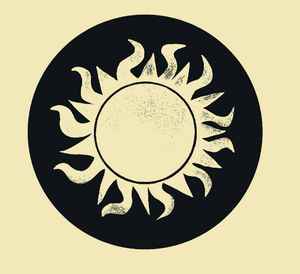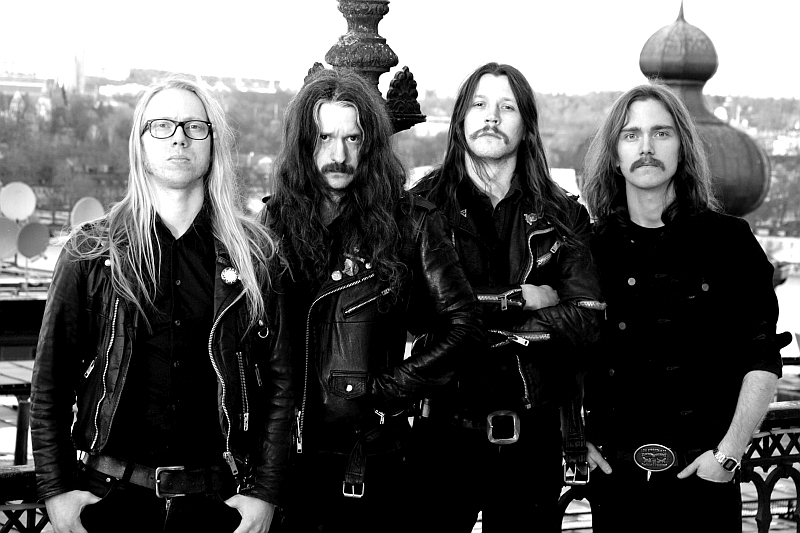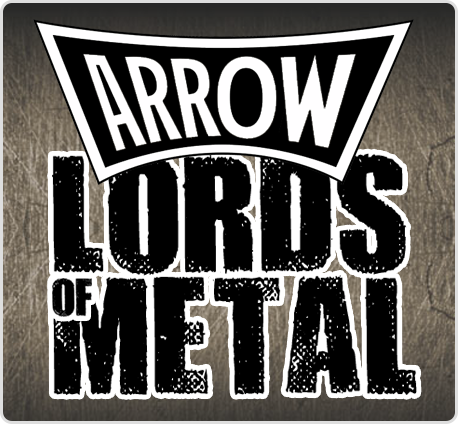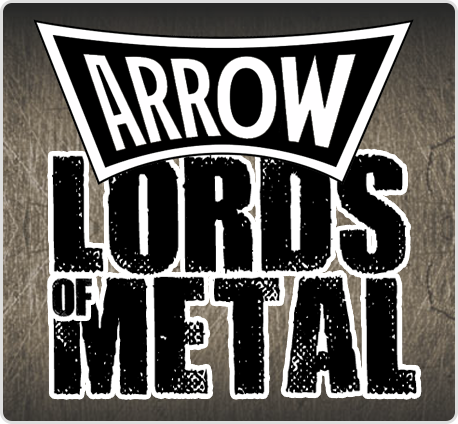
Jakob Ljungberg: “We were supposed to mix English and Swedish from the beginning, but the person in charge of the English lyrics quit the band, haha. And then things just sort of happened, and here we are. We might try some English at some point, but we’ll cross that bridge when we get there!”
Onlangs verscheen een nieuw album van de Zweedse band Second Sun, getiteld ‘Kampen Går Vidare’. Net als het eerdere werk is het compleet in het Zweeds. We spraken met zanger/guitarist Jakob Ljungberg over het gebruiken van de eigen taal. Is dat minder bijzonder in Zweden dan het is in Nederland en ook horen we wat er zo speciaal is aan jaren tachtig heavy metal. Het is bijna onvermijdelijk dat in deze tijd ook de gevolgen van Covid-19 ter sprake komen. Heeft de muziekwereld in Zweden er net zo veel last van als elders in de wereld?
Jan-Simon Hoogschagen Ι 01 december 2020
Thank you for taking some time to talk to us about your latest record ‘Kampen går vidare’. What strikes us in the Netherlands most, is the fact that it is possible to make a cool record with lyrics in another language than English. Over here we hardly have any bands singing in Dutch, at least not in the more alternative genres, let alone metal. It is only very recently that some underground black metal bands began to use Dutch. How is that in Sweden?:
There are some bands that sing all or part of their repertoire in Swedish but most bands sing in English. There isn’t a huge “scene” for bands singing in Swedish around here even if most people are probably more accepting of it than in some other countries. There has been rock bands singing in Swedish during the last 50 years, so I guess people are used to it, haha.
Don’t you think you make it more difficult for possible fans outside Sweden to relate to what you’re singing about or does it just make you more aware that you need to write f-ing great tunes?
Probably yes. But I hope that people realize that good music is good music, whichever shape or form it has. I listen to a lot of bands where I can’t understand a word and hopefully the songs are powerful enough to come across even without understanding the language.
For instance, I tried to understand the lyrics, but although I have some basic knowledge of the Scandinavian languages, I could not fathom them. I saw the video for ‘Hatar Det Ändå’, which was very funny and had an original way of showing the lyrics. But even the help of Google translate proved to be useless, perhaps the quality of its Swedish to Dutch translations is not that good, so can you please give us an idea what the songs on ‘Kampen går vidare’ are about?
The whole album is a concept album about the journey of awareness (political and on other levels) through a person’s life. From happy revolutionary to hardened cynic. The songs reflect different stages of this journey. The chorus of Hatar Det Ändå roughly translates to “It would feel wrong to not have an opinion, I got to show everyone what I’m about, I am of this opinion mostly because of old habit because I don’t actually care that much, but I hate it anyway.” The song is about where our main character is pretty much on terms with that they don’t know everything about everything but they still feel the need to express an opinion on everything.
What made you decide to sing in Swedish instead of doing what almost everyone does (use English)? Was it a deliberate choice from the start?
We were supposed to mix English and Swedish from the beginning, but the person in charge of the English lyrics quit the band, haha. And then things just sort of happened, and here we are. We might try some English at some point, but we’ll cross that bridge when we get there!
Second Sun seems to channel back to the seventies for inspiration. Why did you go back to that period and ignore or forget everything that has been done in metal since, let’s say 1980?
I sort of understand how you’re thinking, but I disagree! We do not in the slightest ignore or forget anything that has been done in the eighties. The biggest inspiration for Kampen Går Vidare was Black Sabbath’s Heaven And Hell, and we took a lot of inspiration from The Number of the Beast and such great heavy metal milestones. We were actually hoping that people would think more 1983 than 1975 with this album, but I guess we’ll have to try even harder next time for that to come across, haha.
You define yourself as a “social realist hard rock band”. What does that mean, I do not suppose it has any link to Soviet Union propagandistic art?
No, not really. “Socialrealism” or ”socialrealistisk” is an expression in Swedish that means roughly that things are (often quite darkly or ironically) depicted without glamour or polishing – socially realistic, I guess.
It seems Second Sun is no stranger to name dropping, as you list a wide variety of famous influences from Jethro Tull, Blue Oyster Cult to Alice Cooper, Thin Lizzy and W.A.S.P. What makes these particular bands so important for you guys?
Jethro Tull is my all time favorite band – huge influence with all the folkiness and all the progressive elements. BÖC is one of our common favorites, Secret Treaties always puts you in the mood – one of the best records in history, that guitar work really changed things. Alice Cooper is such a great progressive band with long winding tunes and lots of mood swings, but everything is covered in hard rock and cool theatrics, so you don’t even think about it – fantastic band! Thin Lizzy is forever one of the greatest, melodies, lyrics, the sheer musicianship, fantastic – take Thunder & Lighting for a spin right now! W.A.S.P is such a good band for the first 5 or so records, but the reason we name dropped them for this release is because of the Crimson Idol album, it’s shock full of hits AND it has a compelling story. Listen to the whole thing in silent contemplation or blast choice cuts while drinking with friends, it works perfectly in both situations!
Given the fact you use the Swedish language as one of your unique selling points, I sort of expected names like Kebnekajse, November or even Älgarnas Trädgård as well, but these Swedish bands are never mentioned. Do you not feel you are some sort of heirs to these early seventies bands? After all, they also played a form of hard rock mixed with prog and they sang in Swedish…
Well, no not really. November is way to blues based for me, and in the same way I would never cite Cream as a huge inspiration, I would never say November, even if some of the stuff is great. Kebnekajse was always an instrumental band to me, I must have missed where they sing in Swedish, I guess I’ve only listened to the second album now that I think about it, big inspiration with the folky melodies anyhow! I never really got into Älgarnas Trädgård, I should give it a go again I guess. I don’t think apart from the language that we sound close to any of the 70’s Swedish bands in that way, and the inspiration to sing in Swedish didn’t really come from them, so even if I dig some of the stuff and there are undeniably good tracks and albums, I do not feel that much kinship with those bands.
At least some of you (Jakob comes to mind) have experience with forms of more modern ‘extreme’ metal, which makes you can compare it with what you’re currently playing. Is this more fun for you?
No not really, it’s more fun in a way because I’m the main songwriter and lyricist but other than that there’s really no difference in the level of enjoyment. I don’t see it as that much of a difference, music is music. Tribulation was always way more influenced by Kebnekajse than Second Sun were, for example.
Let’s focus on the new record now. I understand it was basically recorded in two runs or sessions. Was that part of the plan or did it just happen like that?
We’ve always done it like that, it’s great because you can focus on 4-5 tracks at a time and be in the studio for 4 days. Then you get to practice and write and rehearse new music, and you don’t have to spend 2 weeks in the studio grinding endlessly and losing focus. Plus it helps keeping the record focused since you can get some sort of distance to the first couple of tracks when you write the second half and hopefully balance it out so that the record feels complete and not too samey.
Has it had any influence on the way the album turned out, the fact that half of it was made in summer and the other half in winter?
Maybe a little, we happened to write the emotionally heavier songs for the winter session, so I guess that run was a bit tougher overall. All the songs are written during a long time though, since we have limited studio time there’s really no time for improvisation or vibing with the current state of the world or weather.
Somehow I got the impression that this is an album that was made somewhere in a log cabin far above the polar circle, where it is dark for twenty hours each day and everyone gets depressed, which in turn is reflected in the music. Yet the album was recorded in Stockholm, so far from all of that. Am I projecting some kind of stereotypical idea of Sweden and the Swedes here?
I’m afraid you are. The album is written in Stockholm, mostly in my tiny apartment. If you could understand the lyrics, it might occur more “street” to you I guess, haha.
I understood that ‘Kampen Går Vidare’ is a concept album, but since very few of our readers know enough Swedish to get it by listening to the lyrics, can you tell us what the theme of the album is?
Like I talked about before, the album is about a person that goes from bright eyed idealist to hardened cynic and/or caring more about themselves. During the first few tracks the main character is full of hope and gradually they become less and less interested in the outer world and more and more interested in looking after your own back yard.

In a review of the album it was described like a fun, upbeat album, only such a pity it has such depressing lyrics. Was this juxtaposition intended? While doing some research for this interview I came across an interview in which you mentioned Peter Steele of Carnivore and Type O Negative as one of your heroes. Has he been an influence for this album – or at all?
I don’t think our material is that upbeat, I would describe it more as a clenched fist in your pocket while rain is falling on your face, but maybe the lyrics help that image to come across. Steele has always been a great inspiration for me, how he writes tongue in cheek and ironically without being a ”funny guy”, plus the songs fucking rule. His spirit is always present in everything I write.
Over here we look at the Nordic countries with some jealousy, because all the good metal and hard rock seems to be coming from there. But it would be too easy to pile Norway, Sweden and Finland on one big pile as there are big differences, or specialisation even. For instance, I get the impression there is a much bigger “scene” that is interested in seventies style hardrock and prog in Sweden than in those other countries. More or less the kind of music you make. Is that a correct assumption and something you notice yourself too?
Well, yes and no. There are a lot of bands, but a very small population. Also a lot of music interested people move away from their home towns which leads to there only being a few towns/venues where you can play I think a lot of Swedish bands have their biggest crowds outside of Sweden.
I suppose a lot has been said about the influence of Covid-19 on the Music industry. The record was already recorded before all hell broke loose, but did it in other ways affect Second Sun and the release of this new record?
We postponed it for a few months and haven’t been able to play any shows, but other than that not very much.
Although we do not get that much news from Sweden, the impression is that things continued relatively unhindered in Sweden, in stark contrast to the situation in much of the rest of the world. Is that how it really is, or do we have an idealistic image of Sweden in these Corona times?
Restrictions haven’t been as strict as in other places, but things have in no way been unhindered. No shows have been played, bars are closing, lots of people stand without work and everything is uncertain.
Have you been able to work and play as a band, or have you been forced to resort to streaming sessions from the practice room?
We’ve kept to the guidelines and have been able to meet from time to time, but a lot of stuff has been forced to be going on without us being able to meet.
How are things now, do you dare to make plans for next year or is it more like waiting to the storm resides?
More like waiting I guess, we already had to cancel some plans so right now we’re working on new songs and trying to keep safe and sane until we can properly perform.
Let’s try to look at possible positive sides of the current situation: has all the extra free time led to anything for you? Some people I know are bored to death, they have seen everything on Netflix and are completely apathetic. Others say they finally have the time to do what they never got to doing. How is that for you, have you been discovering new, interesting music, learning new skills, writing stuff for a few more albums, going new directions or have you just been stockpiling toilet paper and baking banana bread?
I have been keeping busy with listening to music and writing stuff. I study and work full time and recently I became a parent so it’s hard to tell if things had been that different for me, I don’t see much people or do much social activities anyway. If we’re looking at the bright side, people, me included, have finally had the time to sit down quietly and consume some culture for once instead of just rushing between two appointments with a few songs from some old album in your headphones.
Do you think the pandemic has led to extra creativity or is it more like stagnation with people waiting until they can go back to their normal routines?
Depends on where your creativity springs from. The urge to express yourself will never end, but some people will likely get depressed from the fact that you won’t be able to do shows in a foreseeable future. It must suck for bands in the making that sort of relies on small shows to get better and shaping their sound/thing. Ten or fifteen years ago this might have been really hard for my musicianship and/or creativity since I was never the practicing kind, but now it doesn’t really bother me as long as you can make recordings.
A few closing questions I ask most bands: Suppose you had to spend the rest of your life on a deserted island and could take a record player with you and only five records. Which ones would you take with you and why exactly these?
They vary from day to day of course, but today it’s these:
Jethro Tull – ‘Thick as a Brick’, all time favorite
Raven – ‘Wiped Out’, pure energy and playfulness
The Streets – ‘Original Pirate Material’, fantastic poetry and mesmerizing music
Grails – ‘Deep Politics’, one of the most hauntingly beautiful records of all time
Second Sun – ‘Kampen Går Vidare’, just to remind myself that I was once not living on a desert island and that you have to keep pushing, even if your strength is gone.
Is there anything – apart from good music – you cannot do without? Or things you’d like to get rid of immediately? Does this in any way affect the music you create?
Even if I had to sell everything, I would always try keeping one guitar, even the shittiest cheapest one, just to be able to create something from nothing – it’s an amazing feeling. Things I wanted to get rid of immediately are hopefully already gone, and they include bad people, bad habits and bad priorities.
Thank you for your time. Here at Lords of Metal we wish you all the best, stay safe and we hope to hear a lot more from you. Perhaps we can even see you perform live at a show hopefully sooner than later. Any final words or wise thoughts you would like to share with our readers?
Hopefully sooner than later, yes! Support bands and labels you dig, right now your contribution is more vital than ever if anyone is going to survive this situation. Imagine a world without independent record labels or cool bands to release your favorite albums to come, what a terrible place. Keep the faith and stay safe!



